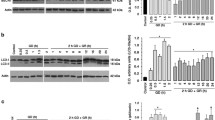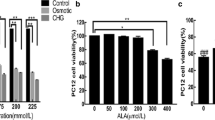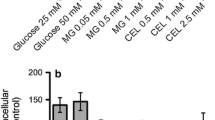Abstract
Though glucose fluctuations have been considered as an adverse factor for the development of several diabetes-related complications, their impact in the central nervous system is still not fully elucidated. This study was conducted to evaluate the responses of neuronal cells to different glycemic exposures alongside to elucidate the role of uncoupling protein 2 (UCP2) in regulating such responses. To achieve our goals, primary cortical neurons were submitted to constant high (HG)/low (LG) or glucose level variations (GVs), and the pharmacological inhibition of UCP2 activity was performed using genipin. Results obtained show that GV decreased neuronal cells’ viability, mitochondrial membrane potential, and manganese superoxide dismutase activity and increased reactive oxygen species (ROS) production. GV also caused an increase in the glutathione/glutathione disulfide ratio and in the protein expression levels of nuclear factor E2-related factor 2 (NRF2), UCP2, NADH-ubiquinone oxidoreductase chain 1 (ND1), and mitochondrially encoded cytochrome c oxidase I (MTCO1), both mitochondrial DNA encoded subunits of the electron transport chain. Contrariwise, genipin abrogated all those compensations and increased the levels of caspase 3-like activity, potentiated mitochondrial ROS levels, and the loss of neuronal synaptic integrity, decreased the protein expression levels of NRF1, and increased the protein expression levels of UCP5. Further, in the control and LG conditions, genipin increased mitochondrial ROS and the protein expression levels of UCP4, postsynaptic density protein 95 (PSD95), ND1, and MTCO1. Overall, these observations suggest that UCP2 is in the core of neuronal cell protection and/or adaptation against GV-mediated effects and that other isoforms of neuronal UCPs can be upregulated to compensate the inhibition of UCP2 activity.






Similar content being viewed by others
References
Abdul-Rahman O, Sasvari-Szekely M, Ver A, Rosta K, Szasz BK, Kereszturi E, Keszler G (2012) Altered gene expression profiles in the hippocampus and prefrontal cortex of type 2 diabetic rats. BMC Genomics 13:81. https://doi.org/10.1186/1471-2164-13-81
Alam U, Asghar O, Azmi S, Malik RA (2014) General aspects of diabetes mellitus. Handb Clin Neurol 126:211–222. https://doi.org/10.1016/B978-0-444-53480-4.00015-1
Andrews ZB (2010) Uncoupling protein-2 and the potential link between metabolism and longevity. Curr Aging Sci 3:102–112
Andrews ZB, Diano S, Horvath TL (2005) Mitochondrial uncoupling proteins in the CNS: in support of function and survival. Nat Rev Neurosci 6:829–840. https://doi.org/10.1038/nrn1767
Arsenijevic D, Onuma H, Pecqueur C, Raimbault S, Manning BS, Miroux B, Couplan E, Alves-Guerra MC, Goubern M, Surwit R, Bouillaud F, Richard D, Collins S, Ricquier D (2000) Disruption of the uncoupling protein-2 gene in mice reveals a role in immunity and reactive oxygen species production. Nat Genet 26:435–439. https://doi.org/10.1038/82565
Brand MD, Affourtit C, Esteves TC, Green K, Lambert AJ, Miwa S, Pakay JL, Parker N (2004) Mitochondrial superoxide: production, biological effects, and activation of uncoupling proteins. Free Radic Biol Med 37:755–767. https://doi.org/10.1016/j.freeradbiomed.2004.05.034
Brownlee M, Hirsch IB (2006) Glycemic variability: a hemoglobin A1c-independent risk factor for diabetic complications. JAMA 295:1707–1708. https://doi.org/10.1001/jama.295.14.1707
Calkins MJ, Johnson DA, Townsend JA, Vargas MR, Dowell JA, Williamson TP, Kraft AD, Lee JM, Li J, Johnson JA (2009) The Nrf2/ARE pathway as a potential therapeutic target in neurodegenerative disease. Antioxid Redox Signal 11:497–508. https://doi.org/10.1089/ARS.2008.2242
Cardoso S, Santos RX, Correia SC, Carvalho C, Santos MS, Baldeiras I, Oliveira CR, Moreira PI (2013a) Insulin-induced recurrent hypoglycemia exacerbates diabetic brain mitochondrial dysfunction and oxidative imbalance. Neurobiol Dis 49:1–12. https://doi.org/10.1016/j.nbd.2012.08.008
Cardoso S, Santos MS, Moreno A, Moreira PI (2013b) UCP2 and ANT differently modulate proton-leak in brain mitochondria of long-term hyperglycemic and recurrent hypoglycemic rats. J Bioenerg Biomembr 45:397–407. https://doi.org/10.1007/s10863-013-9503-2
Cardoso S, Correia S, Carvalho C, Candeias E, Plácido AI, Duarte AI, Seiça RM, Moreira PI (2015) Perspectives on mitochondrial uncoupling proteins-mediated neuroprotection. J Bioenerg Biomembr 47:119–131. https://doi.org/10.1007/s10863-014-9580-x
Ceretta LB, Réus GZ, Abelaira HM, Ribeiro KF, Zappellini G, Felisbino FF, Steckert AV, Dal-Pizzol F, Quevedo J (2012, 2012) Increased oxidative stress and imbalance in antioxidant enzymes in the brains of alloxan-induced diabetic rats. Exp Diabetes Res 302682. https://doi.org/10.1155/2012/302682
Ceriello A, Ihnat MA (2010) ‘Glycaemic variability’: a new therapeutic challenge in diabetes and the critical care setting. Diabet Med 27:862–867. https://doi.org/10.1111/j.1464-5491.2010.02967.x
Chen XL, Tang WX, Tang XH, Qin W, Gong M (2014) Downregulation of uncoupling protein-2 by genipin exacerbates diabetes-induced kidney proximal tubular cells apoptosis. Ren Fail 36:1298–1303. https://doi.org/10.3109/0886022X.2014.930650
Cho YS, Lee JH, Jung KH, Park JW, Moon SH, Choe YS, Lee KH (2016) Molecular mechanism of (18)F-FDG uptake reduction induced by genipin in T47D cancer cell and role of uncoupling protein-2 in cancer cell glucose metabolism. Nucl Med Biol 43:587–592. https://doi.org/10.1016/j.nucmedbio.2016.06.001
Chu AC, Ho PW, Kwok KH, Ho JW, Chan KH, Liu HF, Kung MH, Ramsden DB, Ho SL (2009) Mitochondrial UCP4 attenuates MPP+ − and dopamine-induced oxidative stress, mitochondrial depolarization, and ATP deficiency in neurons and is interlinked with UCP2 expression. Free Radic Biol Med 46:810–820. https://doi.org/10.1016/j.freeradbiomed.2008.12.015
Dickinson BC, Lin VS, Chang CJ (2013) Preparation and use of MitoPY1 for imaging hydrogen peroxide in mitochondria of live cells. Nat Protoc 8:1249–1259. https://doi.org/10.1038/nprot.2013.064
Dietrich MO, Andrews ZB, Horvath TL (2008) Exercise-induced synaptogenesis in the hippocampus is dependent on UCP2-regulated mitochondrial adaptation. J Neurosci 28:10766–10771. https://doi.org/10.1523/JNEUROSCI.2744-08.2008
Echtay KS, Murphy MP, Smith RA, Talbot DA, Brand MD (2002) Superoxide activates mitochondrial uncoupling protein 2 from the matrix side Studies using targeted antioxidants. J Biol Chem 277:47129–47135. https://doi.org/10.1074/jbc.M208262200
Ferreiro E, Resende R, Costa R, Oliveira CR, Pereira CM (2006) An endoplasmic-reticulum-specific apoptotic pathway is involved in prion and amyloid-beta peptides neurotoxicity. Neurobiol Dis 23:669–678. https://doi.org/10.1016/j.nbd.2006.05.011
Flohe L, Otting F (1984) Superoxide dismutase assays. Methods Enzymol 105:93–104
Frontoni S, Di Bartolo P, Avogaro A, Bosi E, Paolisso G, Ceriello A (2013) Glucose variability: an emerging target for the treatment of diabetes mellitus. Diabetes Res Clin Pract 102:86–95. https://doi.org/10.1016/j.diabres.2013.09.007
Hashiba M, Ono M, Hyogo H, Ikeda Y, Masuda K, Yoshioka R, Ishikawa Y, Nagata Y, Munekage K, Ochi T, Hirose A, Nozaki-Fujimura Y, Noguchi S, Okamoto N, Chayama K, Suganuma N, Saibara T (2013) Glycemic variability is an independent predictive factor for development of hepatic fibrosis in nonalcoholic fatty liver disease. PLoS One 8:e76161. https://doi.org/10.1371/journal.pone.0076161
He Y, Wang N, Shen Y, Zheng Z, Xu X (2014) Inhibition of high glucose-induced apoptosis by uncoupling protein 2 in human umbilical vein endothelial cells. Int J Mol Med 33:1275–1281. https://doi.org/10.3892/ijmm.2014.1676
Hermes G, Nagy D, Waterson M, Zsarnovszky A, Varela L, Hajos M, Horvath TL (2016) Role of mitochondrial uncoupling protein-2 (UCP2) in higher brain functions, neuronal plasticity and network oscillation. Mol Metab 5:415–421. https://doi.org/10.1016/j.molmet.2016.04.002
Hirsch IB (2015) Glycemic variability and diabetes complications: does it matter? Of course it does! Diabetes Care 38:1610–1614. https://doi.org/10.2337/dc14-2898
Hissin PJ, Hilf R (1976) A fluorometric method for determination of oxidized and reduced glutathione in tissues. Anal Biochem 74:214–226
Ho JW, Ho PW, Liu HF, So DH, Chan KH, Tse ZH, Kung MH, Ramsden DB, Ho SL (2012) UCP4 is a target effector of the NF-kappaB c-Rel prosurvival pathway against oxidative stress. Free Radic Biol Med 53:383–394. https://doi.org/10.1016/j.freeradbiomed.2012.05.002
Jones SC, Saunders HJ, Qi W, Pollock CA (1999) Intermittent high glucose enhances cell growth and collagen synthesis in cultured human tubulointerstitial cells. Diabetologia 42:1113–1119. https://doi.org/10.1007/s001250051279
Kamboj SS, Sandhir R (2011) Protective effect of N-acetylcysteine supplementation on mitochondrial oxidative stress and mitochondrial enzymes in cerebral cortex of streptozotocin-treated diabetic rats. Mitochondrion 11:214–222. https://doi.org/10.1016/j.mito.2010.09.014
Koziel A, Sobieraj I, Jarmuszkiewicz W (2015) Increased activity of mitochondrial uncoupling protein 2 improves stress resistance in cultured endothelial cells exposed in vitro to high glucose levels. Am J Physiol Heart Circ Physiol 309:H147–H156. https://doi.org/10.1152/ajpheart.00759.2014
Krauss S, Zhang CY, Lowell BB (2005) The mitochondrial uncoupling-protein homologues. Nat Rev Mol Cell Biol 6:248–261. https://doi.org/10.1038/nrm1572
Kuricova K, Pacal L, Soupal J, Prazny M, Kankova K (2016) Effect of glucose variability on pathways associated with glucotoxicity in diabetes: evaluation of a novel in vitro experimental approach. Diabetes Res Clin Pract 114:1–8. https://doi.org/10.1016/j.diabres.2016.02.006
Liu D, Chan SL, de Souza-Pinto NC, Slevin JR, Wersto RP, Zhan M, Mustafa K, de Cabo R, Mattson MP (2006) Mitochondrial UCP4 mediates an adaptive shift in energy metabolism and increases the resistance of neurons to metabolic and oxidative stress. NeuroMolecular Med 8:389–414
Liu TS, Pei YH, Peng YP, Chen J, Jiang SS, Gong JB (2014) Oscillating high glucose enhances oxidative stress and apoptosis in human coronary artery endothelial cells. J Endocrinol Investig 37:645–651. https://doi.org/10.1007/s40618-014-0086-5
Lopez-Lluch G, Irusta PM, Navas P, de Cabo R (2008) Mitochondrial biogenesis and healthy aging. Exp Gerontol 43:813–819. https://doi.org/10.1016/j.exger.2008.06.014
Ma S, Yang D, Li D, Tan Y, Tang B, Yang Y (2012) Inhibition of uncoupling protein 2 with genipin exacerbates palmitate-induced hepatic steatosis. Lipids in health and disease 11:154 https://doi.org/10.1186/1476-511X-11-154
Mattiasson G, Shamloo M, Gido G, Mathi K, Tomasevic G, Yi S, Warden CH, Castilho RF, Melcher T, Gonzalez-Zulueta M, Nikolich K, Wieloch T (2003) Uncoupling protein-2 prevents neuronal death and diminishes brain dysfunction after stroke and brain trauma. Nat Med 9:1062–1068. https://doi.org/10.1038/nm903
Mehta SL, Li PA (2009) Neuroprotective role of mitochondrial uncoupling protein 2 in cerebral stroke. J Cereb Blood Flow Metab 29:1069–1078. https://doi.org/10.1038/jcbfm.2009.4
Monnier L, Mas E, Ginet C, Michel F, Villon L, Cristol JP, Colette C (2006) Activation of oxidative stress by acute glucose fluctuations compared with sustained chronic hyperglycemia in patients with type 2 diabetes. JAMA 295:1681–1687. https://doi.org/10.1001/jama.295.14.1681
Moreira PI, Santos MS, Sena C, Nunes E, Seica R, Oliveira CR (2005) CoQ10 therapy attenuates amyloid beta-peptide toxicity in brain mitochondria isolated from aged diabetic rats. Exp Neurol 196:112–119. https://doi.org/10.1016/j.expneurol.2005.07.012
Nakase T, Yoshida Y, Nagata K (2007) Amplified expression of uncoupling proteins in human brain ischemic lesions. Neuropathology 27:442–447
Nalysnyk L, Hernandez-Medina M, Krishnarajah G (2010) Glycaemic variability and complications in patients with diabetes mellitus: evidence from a systematic review of the literature. Diabetes Obes Metab 12:288–298. https://doi.org/10.1111/j.1463-1326.2009.01160.x
Nam KN, Choi YS, Jung HJ, Park GH, Park JM, Moon SK, Cho KH, Kang C, Kang I, Oh MS, Lee EH (2010) Genipin inhibits the inflammatory response of rat brain microglial cells. Int Immunopharmacol 10:493–499. https://doi.org/10.1016/j.intimp.2010.01.011
O’Brien J, Wilson I, Orton T, Pognan F (2006) Investigation of the Alamar blue (resazurin) fluorescent dye for the assessment of mammalian cell cytotoxicity. Eur J Biochem 267:5421–5426
Picconi F, Parravano M, Ylli D, Pasqualetti P, Coluzzi S, Giordani I, Malandrucco I, Lauro D, Scarinci F, Giorno P, Varano M, Frontoni S (2017) Retinal neurodegeneration in patients with type 1 diabetes mellitus: the role of glycemic variability. Acta Diabetol 54:489–497. https://doi.org/10.1007/s00592-017-0971-4
Piconi L, Quagliaro L, Assaloni R, Da Ros R, Maier A, Zuodar G, Ceriello A (2006) Constant and intermittent high glucose enhances endothelial cell apoptosis through mitochondrial superoxide overproduction. Diabetes Metab Res Rev 22:198–203. https://doi.org/10.1002/dmrr.613
Quagliaro L, Piconi L, Assaloni R, Martinelli L, Motz E, Ceriello A (2003) Intermittent high glucose enhances apoptosis related to oxidative stress in human umbilical vein endothelial cells: the role of protein kinase C and NAD(P)H-oxidase activation. Diabetes 52:2795–2804
Quincozes-Santos A, Bobermin LD, de Assis AM, Goncalves CA, Souza DO (2017) Fluctuations in glucose levels induce glial toxicity with glutamatergic, oxidative and inflammatory implications. Biochim Biophys Acta 1863:1–14. https://doi.org/10.1016/j.bbadis.2016.09.013
Raefsky SM, Mattson MP (2017) Adaptive responses of neuronal mitochondria to bioenergetic challenges: roles in neuroplasticity and disease resistance. Free Radic Biol Med 102:203–216. https://doi.org/10.1016/j.freeradbiomed.2016.11.045
Rajanbabu V, Galam L, Fukumoto J, Enciso J, Tadikonda P, Lane TN, Bandyopadhyay S, Parthasarathy PT, Cho Y, Cho SH, Lee YC, Lockey RF, Kolliputi N (2015) Genipin suppresses NLRP3 inflammasome activation through uncoupling protein-2. Cell Immunol 297:40–45. https://doi.org/10.1016/j.cellimm.2015.06.002
Ramsden DB, Ho PW, Ho JW, Liu HF, So DH, Tse HM, Chan KH, Ho SL (2012) Human neuronal uncoupling proteins 4 and 5 (UCP4 and UCP5): structural properties, regulation, and physiological role in protection against oxidative stress and mitochondrial dysfunction. Brain and Behavior 2:468–478. https://doi.org/10.1002/brb3.55
Risso A, Mercuri F, Quagliaro L, Damante G, Ceriello A (2001) Intermittent high glucose enhances apoptosis in human umbilical vein endothelial cells in culture. Am J Physiol Endocrinol Metab 281:E924–E930
Rudofsky G Jr, Schroedter A, Schlotterer A, Voron’ko OE, Schlimme M, Tafel J, Isermann BH, Humpert PM, Morcos M, Bierhaus A, Nawroth PP, Hamann A (2006) Functional polymorphisms of UCP2 and UCP3 are associated with a reduced prevalence of diabetic neuropathy in patients with type 1 diabetes. Diabetes Care 29:89–94
Russo VC, Higgins S, Werther GA, Cameron FJ (2012) Effects of fluctuating glucose levels on neuronal cells in vitro. Neurochem Res 37:1768–1782. https://doi.org/10.1007/s11064-012-0789-y
Saisho Y (2014) Glycemic variability and oxidative stress: a link between diabetes and cardiovascular disease? Int J Mol Sci 15:18381–18406. https://doi.org/10.3390/ijms151018381
Sajja RK, Cucullo L (2015) Altered glycaemia differentially modulates efflux transporter expression and activity in hCMEC/D3 cell line. Neurosci Lett 598:59–65. https://doi.org/10.1016/j.neulet.2015.05.015
Scarpulla RC (2008) Transcriptional paradigms in mammalian mitochondrial biogenesis and function. Physiol Rev 88:611–638. https://doi.org/10.1152/physrev.00025.2007
Seli E, Horvath TL (2013) Natural birth-induced UCP2 in brain development. Rev Endocr Metab Disord 14:347–350. https://doi.org/10.1007/s11154-013-9262-8
Siegelaar SE, Holleman F, Hoekstra JB, DeVries JH (2010) Glucose variability; does it matter? Endocr Rev 31:171–182. https://doi.org/10.1210/er.2009-0021
Simon-Areces J, Dietrich MO, Hermes G, Garcia-Segura LM, Arevalo MA, Horvath TL (2012) UCP2 induced by natural birth regulates neuronal differentiation of the hippocampus and related adult behavior. PLoS One 7:e42911. https://doi.org/10.1371/journal.pone.0042911
Souza BM, Assmann TS, Kliemann LM, Gross JL, Canani LH, Crispim D (2011) The role of uncoupling protein 2 (UCP2) on the development of type 2 diabetes mellitus and its chronic complications. Arquivos brasileiros de endocrinologia e metabologia 55:239–248
Stocchi V, Magnani M, Cucchiarini L, Novelli G, Dallapiccola B (1985) Red blood cell adenine nucleotides abnormalities in Down syndrome. Am J Med Genet 20:131–135. https://doi.org/10.1002/ajmg.1320200116
Tay J, Thompson CH, Brinkworth GD (2015) Glycemic variability: assessing glycemia differently and the implications for dietary management of diabetes. Annu Rev Nutr 35:389–424. https://doi.org/10.1146/annurev-nutr-121214-104422
Teshima Y, Akao M, Jones SP, Marban E (2003) Uncoupling protein-2 overexpression inhibits mitochondrial death pathway in cardiomyocytes. Circ Res 93:192–200. https://doi.org/10.1161/01.RES.0000085581.60197.4D
Wei Z, Chigurupati S, Bagsiyao P, Henriquez A, Chan SL (2009) The brain uncoupling protein UCP4 attenuates mitochondrial toxin-induced cell death: role of extracellular signal-regulated kinases in bioenergetics adaptation and cell survival. Neurotox Res 16:14–29
Wu Z, Puigserver P, Andersson U, Zhang C, Adelmant G, Mootha V, Troy A, Cinti S, Lowell B, Scarpulla RC, Spiegelman BM (1999) Mechanisms controlling mitochondrial biogenesis and respiration through the thermogenic coactivator PGC-1. Cell 98:115–124. https://doi.org/10.1016/S0092-8674(00)80611-X
Yin X, Zheng F, Pan Q, Zhang S, Yu D, Xu Z, Li H (2015) Glucose fluctuation increased hepatocyte apoptosis under lipotoxicity and the involvement of mitochondrial permeability transition opening. J Mol Endocrinol 55:169–181. https://doi.org/10.1530/JME-15-0101
Yu SX, Du CT, Chen W, Lei QQ, Li N, Qi S, Zhang XJ, Hu GQ, Deng XM, Han WY, Yang YJ (2015) Genipin inhibits NLRP3 and NLRC4 inflammasome activation via autophagy suppression. Sci Rep 5:17935. https://doi.org/10.1038/srep17935
Zhang CY, Parton LE, Ye CP, Krauss S, Shen R, Lin CT, Porco JA Jr, Lowell BB (2006) Genipin inhibits UCP2-mediated proton leak and acutely reverses obesity- and high glucose-induced beta cell dysfunction in isolated pancreatic islets. Cell Metab 3:417–427. https://doi.org/10.1016/j.cmet.2006.04.010
Zhang X, Xu X, Jiao X, Wu J, Zhou S, Lv X (2013)The effects of glucose fluctuation on the severity of coronary artery disease in type 2 diabetes mellitus. Journal of diabetes research 2013:576916. https://doi.org/10.1155/2013/576916
Acknowledgments
The authors’ work is supported by FEDER funds through the Operational Programme Competitiveness Factors (COMPETE) and national funds by Foundation for Science and Technology (FCT) under the project (PEst-C/SAU/LA0001/2013-2014) and strategic project UID/NEU/04539/2013. Susana Cardoso is recipient of a PostDoc fellowship from the FCT (SFRH/BPD/95770/2013).
We thank Dr. Angelo Tomé (from Center for Neuroscience and Cell Biology (CNC), University of Coimbra, 3004-504 Coimbra) for his essential assistance with HPLC apparatus and measurement of intracellular adenine nucleotide levels.
Author information
Authors and Affiliations
Corresponding author
Ethics declarations
Conflict of Interest
The authors declare that they have no conflict of interest.
Rights and permissions
About this article
Cite this article
Cardoso, S., Seiça, R.M. & Moreira, P.I. Uncoupling Protein 2 Inhibition Exacerbates Glucose Fluctuation-Mediated Neuronal Effects. Neurotox Res 33, 388–401 (2018). https://doi.org/10.1007/s12640-017-9805-y
Received:
Revised:
Accepted:
Published:
Issue Date:
DOI: https://doi.org/10.1007/s12640-017-9805-y




